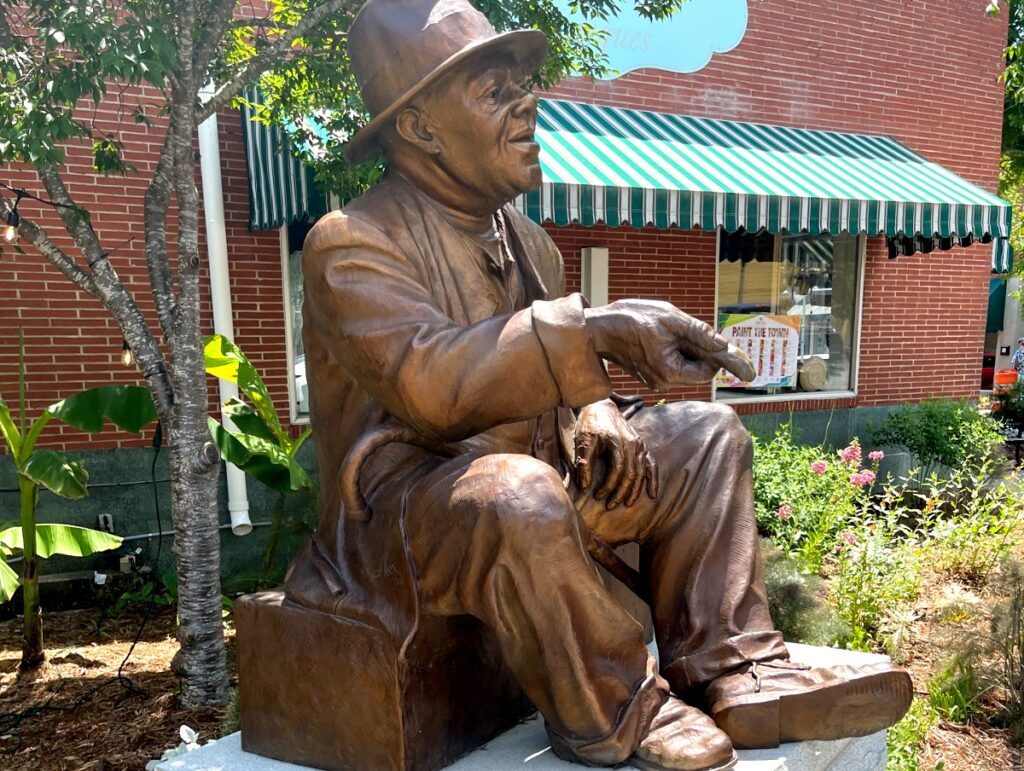STATEHOUSE REPORT | ISSUE 23.18 | May 3, 2024
BIG STORY: Massive energy bill on life support in S.C. Senate
MORE NEWS: Medical marijuana in S.C. may be dead after House inaction
LOWCOUNTRY, Ariail: Straight from the horse’s mouth
COMMENTARY, Brack: Trump 2.0 would go way too far
SPOTLIGHT: The S.C. Education Association
MYSTERY PHOTO: Sitting in a shady place
FEEDBACK: Send us your thoughts
Massive energy bill on life support in S.C. Senate

By Jack O’Toole | With only three working days left in this year’s regular legislative session, a controversial energy bill that looked like an irresistible force coming out of the South Carolina House has met an immovable object. Its name? The South Carolina Senate. Senators haven’t scheduled a floor vote on the utility-friendly bill.
So the question now is whether the stalled bill is actually dead – or can one senator’s compromise plan get it restarted before the clock runs out Thursday?

As the Senate’s intention to block the bill became clear this week, frustrations reached a boiling point among supporters in the House with Seneca Republican Rep. Bill Sandifer employing a seldom-invoked rule to attach the 70-page energy bill to an unrelated suicide prevention measure that already passed the Senate. The move, which Sandifer defended as appropriate given the Senate’s inaction, drew outrage from House Democrats.
“I resent the action of this chamber,” said state Rep. Gilda Cobb-Hunter, D-Orangeburg. “It’s a disservice to families who have been crushed by people who commit suicide.”
But Republicans quickly voted down the Democrats’ objection and passed the revamped, cobbled-together bill, which senators say could lead to the collapse of the suicide prevention initiative if the House refuses to remove the extraneous language.
“Wildly overambitious”
While there’s broad agreement that South Carolina, currently the nation’s fastest growing state, will need to bring significant new power generation capacity online over the next decade, the House energy bill engineered by House Speaker Murrell Smith, R-Sumter, has faced withering criticism from the start. Of particular concern have been provisions to weaken utility regulators at the Public Service Commission (PSC), fast track large-scale new natural gas plants and pipelines, and erect barriers to solar energy projects.
These concerns led then-PSC Commissioner Tom Ervin of Greenville to resign from the utility board on March 13 in protest of the legislation.
“House Bill 5118 would remove important regulatory guardrails,” Ervin wrote in his resignation letter, “resulting in dramatic changes in existing law which will give investor-owned utilities a blank check with guaranteed profits resulting in much higher utility rates for residential customers.”
 Other critics, like League of Women Voters of South Carolina Vice President Lynn Teague, have also noted that much of the anticipated new energy demand is driven not by population growth, but by the state’s ongoing efforts to attract new data centers, like Google’s planned facility in Dorchester County. The data centers, Teague points out, are “energy hogs” that only employ about 20 workers per facility.
Other critics, like League of Women Voters of South Carolina Vice President Lynn Teague, have also noted that much of the anticipated new energy demand is driven not by population growth, but by the state’s ongoing efforts to attract new data centers, like Google’s planned facility in Dorchester County. The data centers, Teague points out, are “energy hogs” that only employ about 20 workers per facility.
“Ideally, there would be a moratorium on building them,” Teague told Statehouse Report Thursday. “Absent that, data centers should pay in full for the energy they use, not expect other ratepayers to subsidize them.”
Of the energy bill itself, Teague says it was “wildly overambitious,” and failed to consider the concerns of ratepayers.
“We are still paying, and will be paying for years, for the failed V.C. Summer,” Teague said, referring to the legislature-approved nuclear power project that was abandoned in 2017 at a cost of $9 billion to ratepayers. “And this bill eliminates the protections we put in place to ensure we don’t have that same kind of problem again.”
Of all the concerns raised by all the bill’s many critics, it’s clear that V.C. Summer is the ghost that’s haunted the process from the start.
In fact, it was the chief concern that Senate Majority Leader Shane Massey, R-Edgefield, discussed when he made his opposition clear in March.
“I am suspicious of efforts to roll-back the regulatory protections that were put in-place just a few years ago,” Massey said. “I am suspicious of efforts to fast-track things. I am resistant to efforts to weaken [the Office of Regulatory Staff’s] powers and to change their mandate.”
A “narrow path” forward?

Beaufort Republican Sen. Tom Davis says there’s still time – barely – for the Senate to pass a slimmed down version of the bill with provisions most legislators and members of the public agree on.
“I think there’s an opportunity,” Davis said in a Thursday interview. “It’s a narrow path and I’ve got people to persuade, but there is time to do it.”
To get there, Davis’s bill would focus on four items:
- Leveling the playing field for independent solar power producers
- Strengthening the PSC with additional resources
- Putting energy efficiency standards in place, and
- Giving Santee Cooper more authority to create partnerships in the context of a stronger regulatory environment.
Davis thinks he has “through the weekend” to get his fellow senators on board.
“It’s important to keep working right through to the end and don’t give up,” he said. “You can’t just throw your hands up in the air and say it’s too complicated, because this isn’t going away.”
- Have a comment? Send to: feedback@statehousereport.com.
Medical marijuana in S.C. may be dead after House inaction

By Jack O’Toole | A panel of state House legislators failed to make a decision this week on a Senate-passed bill that would legalize medical marijuana in South Carolina, probably killing the bill.
“It’s unfortunate,” state Sen. Tom Davis, R-Beaufort, told Statehouse ReportTuesday afternoon. “We passed this in early February and it just sat over there gathering dust. To set hearings with just three weeks left to go in the session creates a procedural impediment that was intentional, quite frankly.”
Davis, who has been pushing the measure for nine years, has said the proposed medical marijuana measure would be the most restrictive in the country. It calls for decriminalizing the drug to relieve pain and suffering for people with certain conditions, such as cancer, multiple sclerosis, epilepsy and post-traumatic stress disorder. It would allow people to eat, vape or apply cannabis as a lotion, but not smoke it as a joint.
“I don’t want to put thoughts in anybody else’s head, but you have to wonder if they [House members] were ever serious about taking it up and debating it honestly,” Davis said.
In related news, the U.S. Department of Justice on Tuesday recommended that marijuana be rescheduled as a Schedule III controlled substance, a classification shared by prescription drugs such as ketamine, testosterone and Tylenol with codeine.
Marijuana is currently classified as a Schedule I drug, which is the same level as addictive substances like heroin which the Drug Enforcement Administration describes as having no currently accepted medical use.
Though the federal recommendation doesn’t decriminalize marijuana, it’s a significant shift from the government that acknowledges the medical benefits of the long-criminalized drug and carries broad implications for cannabis-related research and the industry at large.
In other recent headlines:

Clyburn to receive Presidential Medal of Freedom. News broke Friday morning that South Carolina’s own Democratic U.S. Rep. Jim Clyburn was to be one of 19 people awarded the Presidential Medal of Freedom today by President Joe Biden. Congratulations, congressman.
S.C. Senate approves ban on gender-affirming care transgender minors. The S.C. Senate on Thursday approved a ban on gender-affirming care for transgender minors after supporters defeated efforts to only ban treatments that would be considered irreversible.
S.C. Senate passes anti-squatting measures, but it’s unlikely to become law this year. A visceral fear of some property owners that an unwanted guest could move into their vacant home, refuse to leave and then claim ownership has been a trending story on social media, prompting swift legislative action.
S.C. gas pipeline operator seeks rate hike, potentially inflating power bills. South Carolina’s biggest pipeline player, Carolina Gas Transmission, wants an 85% increase in the price it charges utilities to supply natural gas, a move that could cost consumers.
Bill headed to McMaster to remove sales tax from period products. The state Senate unanimously approved a bill Tuesday to make menstrual or period products tax-exempt in South Carolina, an exemption already in place in more than 30 other states. The deal that finally brought the bill to the Senate floor came after Colleton County Democratic Sen. Margie Bright Matthews exercised senatorial privilege to place a hold on legislation exempting golf club memberships from taxation.
S.C. lawmakers demand investigation into claims non-citizens received voter forms. S.C. Rep. Adam Morgan, R-Greenville, is calling for a hearing with South Carolina’s Medicaid director following allegations that the agency sent voter registration materials to a non-U.S. citizen. The state election commission, however, said there’s no substantial evidence that people fraudulently registered to vote.
S.C. Senate approves hog hunting bill. The state Senate voted last week to approve Edgefield Republican Rep. Bill Hixon’s bill allowing the hunting of feral hogs via helicopter on properties larger than 500 acres.
“Constitutional carry” now legal, but hundreds still face charges. More than a thousand people around South Carolina are facing charges for gun crimes that are no longer illegal since Gov. Henry McMaster signed the permitless carry bill into law on March 7.
Straight from the horse’s mouth

Nationally award-winning cartoonist Robert Ariail always has an interesting take. This week, he’s taking a look at pari-mutuel betting. What do you think – love the cartoon? Hate it? What do you think: feedback@statehousereport.com.
Trump 2.0 would go way too far if reelected

By Andy Brack | If you want to be frightened in May more than anything you’ve ever experienced on Halloween, just read the new Time interview with former President Donald Trump.
 Any lover of American democracy – independent, Republican or Democrat – should be terrified. Trump 2.0 – the guy accused of dozens of felonies and currently on trial for paying hush-money to a porn star – is way more scary than the guy who won the nation’s top office in 2016.
Any lover of American democracy – independent, Republican or Democrat – should be terrified. Trump 2.0 – the guy accused of dozens of felonies and currently on trial for paying hush-money to a porn star – is way more scary than the guy who won the nation’s top office in 2016.
Reporter Eric Cortellessa sat down twice with Trump at his Palm Beach compound and interviewed a lot of people inside his circle before writing “How Far Trump Would Go,” a 26-minute read that should shake any lover of freedom to the core. His conclusion: Today’s Trump thinks he was too nice in his four years as president. If he gets another four years, he won’t be.
Here are quotes from the story that highlight what Trump says he’ll do if he wins a second term (and he’s been saying these things on the stump, not just in an interview with this reporter):
Detention centers: “To carry out a deportation operation designed to remove more than 11 million people from the country, Trump told me, he would be willing to build migrant detention camps and deploy the U.S. military, both at the border and inland.”
Abortion: “He would let red states monitor women’s pregnancies and prosecute those who violate abortion bans.”
Funding: “He would, at his personal discretion, withhold funds appropriated by Congress, according to top advisers.”
Justice: “He would be willing to fire a U.S. Attorney who doesn’t carry out his order to prosecute someone, breaking with a tradition of independent law enforcement that dates from America’s founding.”
Insurrectionist pardons. “He is weighing pardons for every one of his supporters accused of attacking the U.S. Capitol on Jan. 6, 2021, more than 800 of whom have pleaded guilty or been convicted by a jury.”
Allies: “He might not come to the aid of an attacked ally in Europe or Asia if he felt that country wasn’t paying enough for its own defense.”
Civil service, more: “He would gut the U.S. civil service, deploy the National Guard to American cities as he sees fit, close the White House pandemic-preparedness office, and staff his Administration with acolytes who back his false assertion that the 2020 election was stolen.”
In short, Trump would replace real democracy – the kind of freedoms 250 years of Americans fought and died for – with autocracy. He essentially wants to be a king, the kind of leader the Founding Fathers threw off.
When Trump was asked to explain a recent comment that he would be only a “dictator for a day,” the former president reiterated what has become a pat answer – that he was joking. But Cortellessa’s story ends like this:
“Whether or not he was kidding about bringing a tyrannical end to our 248-year experiment in democracy, I ask him, ‘Don’t you see why many Americans see such talk of dictatorship as contrary to our most cherished principles?’ Trump says no. Quite the opposite, he insists. ‘I think a lot of people like it.’”
Time’s cover story on Trump included full transcripts and other fact-checked information for people to understand the veracity of reporting, historian Heather Cox Richardson noted in a commentary.
“The transcripts reflect the former president’s scattershot language that makes little logical sense but conveys impressions by repeating key phrases and advancing a narrative of grievance. The fact-checking reveals that narrative is based largely on fantasy.”
Make no mistake: 2024 presidential candidate Donald Trump is a threat to the democracy and freedoms we’ve taken for granted for far too long.
Andy Brack is editor and publisher of Statehouse Report and the Charleston City Paper. Have a comment? Send to: feedback@statehousereport.com.
The S.C. Education Association
 The public spiritedness of our underwriters allows us to bring Statehouse Report to you at no cost. This week’s spotlighted underwriter is The South Carolina Education Association(The SCEA), the professional association for educators in South Carolina. Educators from pre-K to 12th grade comprise The SCEA. The SCEA is the leading advocate for educational change in South Carolina. Educators in South Carolina look to The SCEA for assistance in every aspect of their professional life. From career planning as a student to retirement assessment as a career teacher, The SCEA offers assistance, guidance, and inspiration for educators.
The public spiritedness of our underwriters allows us to bring Statehouse Report to you at no cost. This week’s spotlighted underwriter is The South Carolina Education Association(The SCEA), the professional association for educators in South Carolina. Educators from pre-K to 12th grade comprise The SCEA. The SCEA is the leading advocate for educational change in South Carolina. Educators in South Carolina look to The SCEA for assistance in every aspect of their professional life. From career planning as a student to retirement assessment as a career teacher, The SCEA offers assistance, guidance, and inspiration for educators.
- Learn more: TheSCEA.org
Sitting in a shady place

Here’s a bronze statue that’s in a small town somewhere in South Carolina that shows a guy sitting in a shady place. Who is it? Where was this photo taken? Send your name, hometown and guess to: feedback@statehousereport.com.
 The mystery photo from the last two weeks was a toughie. It showed a rutted road at Brittlebank Park – site of part of the Southeastern Wildlife Exposition – with the Charleston Police station building in the background. (We thought the horrible park road might be a clue.)
The mystery photo from the last two weeks was a toughie. It showed a rutted road at Brittlebank Park – site of part of the Southeastern Wildlife Exposition – with the Charleston Police station building in the background. (We thought the horrible park road might be a clue.)
Only five people identified the picture so an extra hats off to these fearless photo sleuths: and two people who didn’t leave their hometowns: David Lupo of Mount Pleasant; Curtis Joyner of Charleston; George Graf of Palmyra, Va.; and Ronald Whilder and Lester Dempsey.
- Send us a mystery picture. If you have a photo that you believe will stump readers, send it along (but make sure to tell us what it is because it may stump us too!) Send to: feedback@statehousereport.com and mark it as a photo submission. Thanks.
Send us your thoughts
We encourage you to send in your thoughts about policy and politics impacting South Carolina. We’ve gotten some letters in the last few weeks – some positive, others nasty. We print non-defamatory comments, but unless you provide your contact information – name and hometown, plus a phone number used only by us for verification – we can’t publish your thoughts.
- Have a comment? Send your letters or comments to: feedback@statehousereport.com. Make sure to provide your contact details (name, hometown and phone number for verification. Letters are limited to 150 words.
- ORDER NOW: Copies are in Lowcountry-area bookstores now, but if you can’t swing by, you can order a copy online today.
- Now available as an e-book!
ABOUT STATEHOUSE REPORT
Statehouse Report, founded in 2001 as a weekly legislative forecast that informs readers about what is going to happen in South Carolina politics and policy, is provided to you at no charge every Friday.
- Editor and publisher: Andy Brack, 843.670.3996
- Statehouse bureau chief: Jack O’Toole
Donate today
We’re proud to offer Statehouse Report for free. For more than a dozen years, we’ve been the go-to place for insightful independent policy and political news and views in the Palmetto State. And we love it as much as you do.
But now, we can use your help. If you’ve been thinking of contributing to Statehouse Report over the years, now would be a great time to contribute as we deal with the crisis. In advance, thank you.
Buy the book
Now you can get a copy of editor and publisher Andy Brack’s We Can Do Better, South Carolina! ($14.99) as a paperback or as a Kindle book ($7.99). . The book of essays offers incisive commentaries by editor and publisher Andy Brack on the American South, the common good, vexing problems for the Palmetto State and interesting South Carolina leaders.
More
- Mailing address: Send inquiries by mail to: P.O. Box 21942, Charleston, SC 29413
- Subscriptions are free: Click to subscribe.
- We hope you’ll keep receiving the great news and information from Statehouse Report, but if you need to unsubscribe, go to the bottom of the weekly email issue and follow the instructions.
- Read our sister publication: Charleston City Paper (every Friday in print; Every day online)
- © 2024, Statehouse Report, a publication of City Paper Publishing, LLC. All rights reserved.


